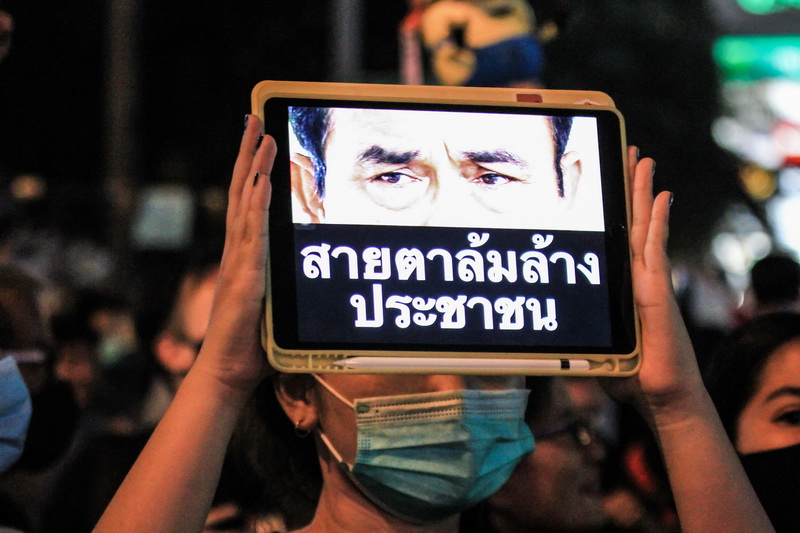Prime Minister Prayuth Chan-o-cha said today that a “reconciliation committee” comprised of lawmakers, senators and protest movement figures would study ways to amend the constitution.
Following a two-day emergency parliamentary session, Prayuth said he would support revising the charter to solve the problems raised by the pro-democracy movement through compromise and “peaceful” methods.
“Everyone is Thai, and I don’t hate anyone, even whoever accuses me of anything,” he said. “I can listen, and I have to be patient as a prime minister. No issue can’t be solved, so I ask you to trust that we will choose the best solution for our country and not just me.”
He told the parliament yesterday that the process of reviewing changes to the charter would be completed by December.
That’s far from what the protest movement’s been demanding. In recent weeks, calls have intensified for Prayuth to step down. They also want the public to vote on representatives to rewrite the constitution to return power to the people.
Arunee Kasayanond, a political science professor and commentator, said Prayuth is just stalling.
“Prayuth must resign,” she tweeted today. “The reconciliation committee is just a game to buy time.”
Confronted by reporters with the question again this afternoon, Prayuth just couldn’t even.
“Why should I answer this?” he said.
A push to move charter reforms through parliament were blocked by stalling tactics one month ago. It takes 84 votes to pass something by majority, and another opposition member was stripped of their office today. Tanwarin Sukkhapisit, the first transgender MP who was elected along with the now-defunct Future Forward Party, was removed from Parliament by the Contitutional Court for having violated election law.
Election history: Thailand votes first-ever genderqueer candidate into parliament
Prayuth and his cabinet today once again extended the emergency decree for another month. The decree, imposed since March in response to the coronavirus pandemic, is now set to expire in December. Critics have accused him of exploiting the situation in an unsuccessful bid to rein in the protests.
As for the special parliamentary sessions which ended yesterday, the 66-year-old retired general said that he appreciated the debate, despite some dramatic moments.
“It will be the House’s responsibility, and although we agree on that, there are many processes to run through. Now we have to follow the 2017 charter until the enforcement of the new one,” he said. “We can’t just establish new rules as demanded. We must live by the constitution, which is the most important law of the country.”
Prayuth overthrew the last democratically elected government in 2014.
The 2017 charter weakened large political party power and enshrined the military’s power over the nation. Approved in a public referendum during which opposing it was a criminal act, the charter allowed Prayuth’s junta to appoint all 250 senators, who had previously been elected by the public.
Campaigners want to change that equation by addressing the dominance of the unelected Senate.
“If the government is sincere about wanting to find a national solution, fixing Section 272 and the ones that don’t require majority votes first,” Arunee said, referring to the constitutional clause allowing senators vote for the prime minister.
Prayuth installed himself as prime minister after the coup, promising to deliver reconciliation following a decade of deepening polarization and conflict. He’s been criticized for using that time to consolidate power and instead silence his critics.
Related
Punt on charter reform vote not meant to ‘buy time,’ ruling party says




